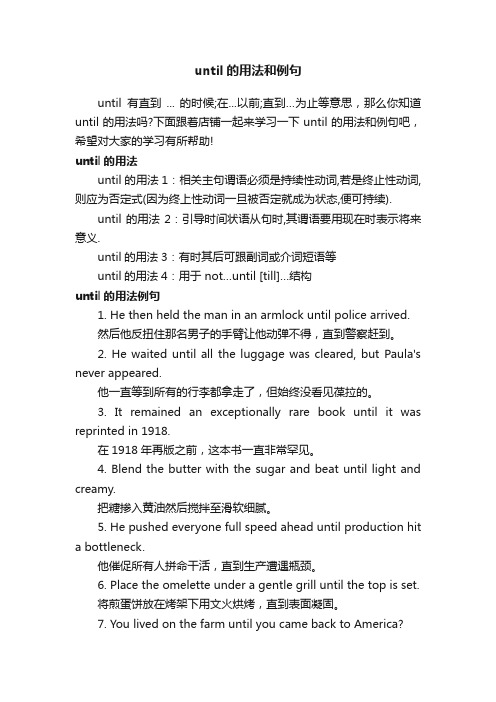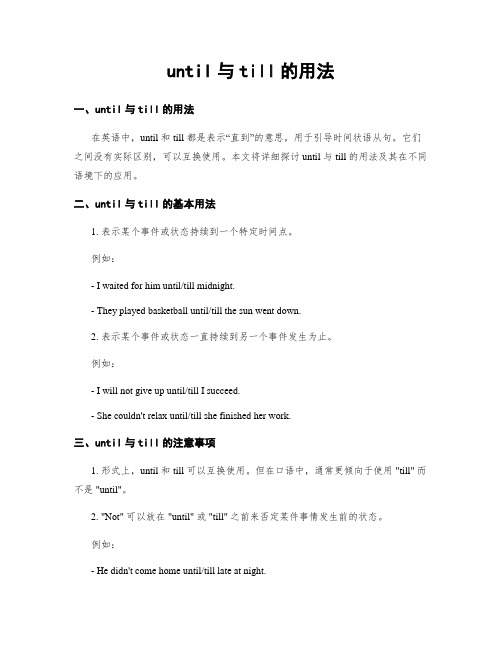引导时间状语的介词inonatduringtill与until的用法
till和until的区别和用法

till和until的区别和用法Till和until是常见的介词和连词,它们的意义基本相同,只是until更强调。
英美国家的语法教师这样解释:XXX表示直到某个特定事件发生后,该事情或状况仍将持续;而until 表示直到某个特定事件发生后,该事情或状况将中止。
但实际上,很多人在使用时容易混淆。
一、在肯定句中,XXX表示“直到……为止”,主句的动词一般延续到XXX所表示的时间为止。
例如:他等到孩子们睡熟才离开。
我会一直在这里等到十二点钟。
二、在否定句中,XXX表示“在……以前”、“直到才”,主句的动词一般是非延续性的,直到XXX所表示的时间才发生。
例如:他早上很晚才来。
比赛开始后他才到。
需要注意的是,如果主句为一般将来时,XXX引导的从句应使用一般现在时代替将来时。
例如:直到所有人上车,车才会开走。
三、在延续性动词的肯定或否定句中,XXX和XXX的含义不同。
例如:会议一直开到七点。
直到七点我们才开始会议。
四、在判断主句中的动词该使用肯定式还是否定式时,可以根据until在否定句后面有“before”的意思来判断。
通常情况下,“before”可以代替“until”,比较着重从某个时间点以前的一段时间。
六、强调结构中的until不能改为till。
例如:电影开始前他没有到,直到电影开始他才到。
我们每天八点开始上课。
七、Not until放在句首时,句子要倒装,其中的until不能改为till。
例如:他原本不打算去,直到最后一刻才改变主意。
直到午夜雨才停。
八、句首通常只用until,不用till。
例如:在那之前,我对此事一无所知。
在你告诉我之前,我对此一无所知。
九、when疑问句中,until要放在句首。
例如:你呆到什么时候?呆到下周一。
十、某些固定词组或谚语中通常只用till。
例如:从早到晚。
until与till的用法归纳

until与till的⽤法归纳until与till的⽤法归纳崔荣斌until和till两者都可作介词、连词,⼀般情况下可以互换使⽤。
⽤于肯定句时,主句的动词只⽤延续性的,它所表⽰的动作⼀直延续到till或until表⽰的时间为⽌,意为“直到……为⽌”;⽤于否定句时,主句的动词⼀般是⾮延续性的,也可以是延续性的,它所表⽰的动作直到till或until所表⽰的时间才发⽣,意为“直到……(才)”。
如:She watched TV until / till her mother came back.她看电视直到她母亲回来。
(看电视的动作延续到母亲回来才结束)She didn”t watch TV until / till her mother came back.直到她母亲回来她才(开始)看电视。
(看电视的动作直到她母亲回来才发⽣)为了同学们更为系统地掌握它们的⽤法,现将⼀些相关知识点作具体的介绍:1. until和till可以作介词或连词。
作介词⽤时,后⾯接名词或副词;作连词⽤时,常⽤来引导⼀个时间状语从句。
当它们⽤于肯定句中,主句动词常为延续性动词,表⽰这个动作⼀直延续到till / until所表⽰的时间为⽌。
当它们引导时间状语从句时往往要⽤⼀般现在时代替⼀般将来时。
如:They worked until / till six o”clock.他们⼀直⼯作到六点钟。
He will wait for you until / till your mother comes.他将等你到你母亲来。
2. not until / till意为“直到……才”,主句常⽤终⽌性动词(即⾮延续性),表⽰until /till所表⽰的时间⼀到,该动作就发⽣。
如:He didn”t go to bed until / till eleven last night.昨天夜⾥他直到⼗⼀点才上床睡觉。
She didn”t know me until / till last week.她直到上⼀周才认识我。
牛津上海版八年级上册since引导的时间状语从句及till、until用法

since引导的时间状语从句until/ till的用法1.since引导的时间状语从句,此用法较复杂。
1)若since引导的状语从句的谓语动词是瞬间动词的过去时,则从句表示的时间是“从该动作开始的那一刻起”。
这是最常见的一种用法。
E.g.He has studied very hard _________(自从)he came to our school.2)若since引导的状语从句的位于动词是延续性动词或表示状态的静态动词的过去时,则从句表示的时间是“从该动作或状态的完成或结束时算起。
E.g.I haven’t heard from him since he lived here.3)若since引导的状语从句的位于未延续性动词的现在完成时,则表示动作和状态延续到现在,其表示的时间的起点应从动词发生之时起。
4)It is+一段时间+since.../It has been +一段时间+since...表示,“从……起已有多长时间了”,用法:since从句中常用一般过去时,若从句中是延续性动词的一般过去时,则表示该动作结束有多长时间。
E.g.It is three years since he smoked.2.until/ till1)until/ till作介词时表示动作持续到什么时候。
E.g.1)I’ll work in the office until six o’clock.2)The talk show won’t be over until 10:00 p.m.2)not...until直到……才表示在这个界限之前一直没有发生这个动作You can’t leave until I come back.PracticeI.Choose the best answer. (选择最恰当的答案)1.Tim didn’t have dinner ________ he finished watching the cartoon.A.whileB. untilC.unlessD.since2.Many students didn’t realize the importance of study ________ they left.A. whenB. untilC. forD. after3.I don’t have to introduce him to you ________ you know the boy.A. untilB. unlessC. sinceD. but4.Mr. Chen has been in Sunshine Town ________ he was two years old.A. forB. sinceC. fromD. because5.Lucy knew nothing about it ________ her sister told her.A. becauseB. untilC. ifD. since6.It ________ about five years since Alice came to China with his family.A. WasB. will beC. isD. were 【答案】1.B 2.B 3.C 4.B 5.B 6.CII.Rewrite the sentences as required.(按要求改写句子)1.My aunt has lived in Shanghai since two years ago.(对划线部分提问)__________ __________ has your aunt lived in Shanghai?2.didn’t, until, go to bed, he, his, came back, father(连词成句)____________________________________________________3.He went home after 11 p.m. last night.(保持句意基本不变)He __________ ___________ home ___________ 11 p.m. last night.【答案】1.How long 2.He didn’t go to bed until his father came back. 3.didn’t go, untilPracticeI. Choose the best answer. (选择最恰当的答案)1.There is a National Science Exhibition ________ the City Museum.A.atB. inC. onD. for2.The Shanghai Museum opened _______ the public on 27th, May.A.ofB. forC. toD. with3.Even the top students in our class can’t work out this problem, so it _______ be very difficult.A.canB. mustC. has toD. need4.The Oriental Pearl Tower doesn’t open ________ 9:00 a.m.A.afterB. untilC. as well asD. as will5.What about ________ to Beijing for a trip by train?A.goB. not goC. goingD. not to go6.Don’t let the boy ________ out at night. It’s not safe.A.goB. goesC. to goD. went7.Mr. Wang has two children. One is Anne. ________ is Tim.A.AnotherB. OtherC. The otherD. The others8.Yesterday morning I got up early ________ be late for the exam.A.in order toB. in order to notC. so as not toD. so as to9.Mr. White _________ Japanese since he left college.A.taughtB. teachesC. has taughtD. will teach10.He’s never visited the Great Wall before, ________?A.is heB. has heC. isn’t heD. hasn’t he【答案】1.A 2.C 3.B 4.B 5.C 6.A 7.C 8.C 9.C 10.Bplete the sentences with given wors in their proper forms. (用所给单词的适当形式填空)1.Mr Green is fond of Chinese ___________. (paint)2.Every student __________ their presents on Christmas Eve. (change)3.My mother was late and missed the ___________ of the film. (begin)4.There will be a wonderful ___________ next week. (exhibit)5.We are very ___________ of our country. (pride)【答案】1.paintings 2.exchanges 3.beginning 4.exhibition 5.proudIII.Rewrite the following sentence as required. (按要求改写句子)1.Jenny lay in bed for a while just now. (改为否定句)Jenny ___________ ___________ in bed for a while just now.2.They have known each other since he came to China. (对划线部分提问)____________ ____________ have they known each other?3.Kitty got up early so that she could catch the train.(保持句意基本不变)Kitty got up early ____________ _____________ to catch the train.4.My mother and I have the same opinion on the project. (保持句意基本不变)My mother ___________ ____________ me on the project.5.My grandfather can hardly believe it. (改为反意疑问句)My grandfather can hardly believe it, _____________ _____________?【答案】1. didn’t lie 2. How long 3. in order 4. agrees with 5.can heHomeworkI. Choose the best answer (选择最恰当的答案)1.My father didn’t have dinner ________ he finished his work.A.whileB. untilC. unlessD. since2.The teacher must speak clearly _________ his students understand him well.A.forB. so thatC. orD.but3.The problem is _________ difficult for me __________ work out.A.very, toB. enough, toC. so, thatD. too, to【答案】1.B 2.B 3.DII.Rewrite the following sentences as required. (按要求改写句子)1.There are trees on either side of the road. (保持句意基本不变)There are trees on ___________ _____________ of the road.2.The Oriental Pearl Tower is open from 8:30 to 9:00 m.(对划线部分提问)___________ __________ is the Oriental Pearl Tower open?3.I turned on the TV when I finished my homework. (保持句意基本不变)I __________ turn on the TV ___________ I finished my homework.4.He has learned English for about 8 years. (保持句意基本不变)It __________ about 8 years __________ he began to learn English.5.The child was so young that he couldn’t join the army. (改为简单句)The child was _________ young ___________ join the army.【答案】1.both sides 2.What time 3.didn’t, until 4.is, since5.too, to。
until的用法和例句

until的用法和例句until有直到 ... 的时候;在...以前;直到…为止等意思,那么你知道until的用法吗?下面跟着店铺一起来学习一下until的用法和例句吧,希望对大家的学习有所帮助!until的用法until的用法1:相关主句谓语必须是持续性动词,若是终止性动词,则应为否定式(因为终上性动词一旦被否定就成为状态,便可持续).until的用法2:引导时间状语从句时,其谓语要用现在时表示将来意义.until的用法3:有时其后可跟副词或介词短语等until的用法4:用于not…until [till]…结构until的用法例句1. He then held the man in an armlock until police arrived.然后他反扭住那名男子的手臂让他动弹不得,直到警察赶到。
2. He waited until all the luggage was cleared, but Paula's never appeared.他一直等到所有的行李都拿走了,但始终没看见葆拉的。
3. It remained an exceptionally rare book until it was reprinted in 1918.在1918年再版之前,这本书一直非常罕见。
4. Blend the butter with the sugar and beat until light and creamy.把糖掺入黄油然后搅拌至滑软细腻。
5. He pushed everyone full speed ahead until production hita bottleneck.他催促所有人拼命干活,直到生产遭遇瓶颈。
6. Place the omelette under a gentle grill until the top is set.将煎蛋饼放在烤架下用文火烘烤,直到表面凝固。
until与till的用法

until与till的用法一、until与till的用法在英语中,until 和 till 都是表示“直到”的意思,用于引导时间状语从句。
它们之间没有实际区别,可以互换使用。
本文将详细探讨 until 与 till 的用法及其在不同语境下的应用。
二、until与till的基本用法1. 表示某个事件或状态持续到一个特定时间点。
例如:- I waited for him until/till midnight.- They played basketball until/till the sun went down.2. 表示某个事件或状态一直持续到另一个事件发生为止。
例如:- I will not give up until/till I succeed.- She couldn't relax until/till she finished her work.三、until与till的注意事项1. 形式上,until 和 till 可以互换使用。
但在口语中,通常更倾向于使用 "till" 而不是 "until"。
2. "Not" 可以放在 "until" 或 "till" 之前来否定某件事情发生前的状态。
例如:- He didn't come home until/till late at night.- She won't be satisfied until/till she gets what she wants.四、until与till的衍生表达方式除了直接使用 "until" 或 "till" 以外,还有一些常见的表达方式可供选择。
1. Up to这个短语与“until” 相似,表示某个事件或状态持续到特定时间点。
例如:- He worked up to his retirement.- The restaurant is open up to 10 pm.2. As far as这个短语指的是某件事情在特定方面一直延续到某个程度。
until 初中用法

until意为“到…时,直到…为止”,既可以用作介词,又可以用作连词。
That may last until Friday. 那也许会持续到周五。
(until用作介词)There will be a wonderful match tonight. I will watch it until it finishes.今晚有一场精彩的比赛。
我要看完它。
(until用作连词)until的用法总结1)用于肯定句,意为“到…时;直到…为止”,引导时间状语从句,主句谓语动词用延续性动词。
I will stay here until you come back. 我将呆在这里直到你回来。
(stay是延续性动词)Continue in this direction until you see a sign.一直沿着这个方向走,直到你看见一个指示牌为止。
(主句是祈使句,continue是延续性动词)He worked until it was dark. 他一直工作到天黑。
(work是延续性动词)2)用于否定句,not...until的意思是“直到…才”,引导时间状语从句,主句谓语动词一般用短暂性动词。
短暂性动词就是瞬间完成的动词,如go,come,leave, die, arrive,buy, enter等, 以enter为例,我们“进”这个动作一瞬间就完成了,不会持续。
I hadn’t realized she was foreign until she spoke. 直到她讲话我才意识到她是外国人。
(realize是短暂性动词)I didn’t manage to do it until you had explained now. 直到你解释了以后我才会做。
(manage是短暂性动词,manage to do something努力做某事,设法做某事,设法做成某事)He didn’t leave the office until he finished his work.他完成工作才离开了办公室。
At、in、on、during的用法
At、in、on、during的用法在英语中,介词At、in、on、during的用法十分广泛,它们在句子中起着至关重要的作用。
下面我们将对这些介词的用法进行详细解析,以帮助大家更好地理解和运用它们。
首先,我们来了解一下这几个介词的基本含义和用法:1. At:表示在某一点或某一时刻,如:-I will meet you at3 o'clock.(我将在三点钟与你见面。
)2. In:表示在某一段时间内,如:-She is staying in Paris for a week.(她将在巴黎待一周。
)3. On:表示在某一天或某一天的上午、下午、晚上,如:-We will have a party on Saturday.(我们将在周六举行聚会。
)4. During:表示在某一段时间内,如:-I will work during my vacation.(我在休假期间会工作。
)接下来,我们对比一下这几个介词在以下场景中的用法:1.表示时间点:-At:表示某一具体时间点,如生日、地址等。
-In:表示一段时间,如季节、年份等。
-On:表示某一天的某个具体时间,如早晨、下午等。
-During:表示在某一段时间内,如某个季节、某个活动等。
2.表示地点:-At:表示某一地点,如某个地方、某一楼层等。
-In:表示在某一个范围或空间内,如房间、城市等。
-On:表示在某一个表面或物体上,如纸张、地图等。
通过以上解析,我们可以发现,At、in、on、during这四个介词在时间和地点的表达上有着明确的区分。
在实际应用中,我们需要根据句子的具体语境来选择合适的介词。
希望这篇文章能帮助大家更好地掌握这些介词的用法。
除了时间和地点的表达,At、in、on、during还可以用于表达其他概念,如:1. 表示方向:- At:表示目标或方向,如箭射向目标、目光看向某人等。
- In:表示进入某个范围或空间,如进入房间、进入城市等。
高三英语介词汇总介词
表示时间与日期得介词1、in用在表示年、季节、月份,或泛指上午、下午或晚上得名词前;on用在表示某一天,某一天得上午、下午或晚上得名词前;at用在表示某一时刻或时间上得某一点得词前。
2、for后接“一段时间”,表示某事持续多久,多与完成时连用;during表示“在……期间”;through 表示“一直……,自始至终”。
3、from,since;from表示时间得起点,意为“从……”,多用于“from、、、to/till、、、”中;since表示“自从……以来”。
注意:for与since都常与完成时连用,但for接时间段,since接时间点。
如for two hours(持续)两小时;since last week从上周直到现在。
4、before,by,till,untilbefore指“在……之前”,与after相对。
by指“不迟于,到……时为止,在……以前”,by后接过去时间,常与过去完成时连用;by后接将来时间,常与将来完成时连用。
till(until)“直到……为止”,在肯定句中,till/until必须与延续性动词连用;在否定句中,till/until常与非延续性动词连用。
5、after,inafter+一段时间:表示“在……之后”,用于一般过去时;但时间为点时间时,只能用after,即after+点时间,用于各种时态。
in+一段时间:表示以说话时为起点一段时间之后,与一般将来时连用;但表示“在……之内”时,用于各种时态。
表示方位得介词1、on意为“在……得上面”;over意为“在……(垂直)得正上方”;above意为“在……(不一定垂直)得上方”;under意为“在……(垂直)得正下方”;below意为“在……(不一定垂直)得下方”;near意为“在……附近”;next t o意为“紧挨着……”;round/around意为“在……周围”;by意为“在……旁边”;along表示沿着街、路、河岸等;across主要表示从某物得表面“横过”,涉及“面”得概念;past 意为“从……旁经过”;up表示向上,由南到北,由西到东,由沿海到内陆,由小地方到大地方,由农村到城市,反之则用down;through指从某物得内部“穿过”;over指“越过”某一障碍物。
until和till的用法归纳
一、until的用法1. until是一个介词,表示某个事件或时间点一直延续到另一个事件或时间点为止。
2. 在句子中,until通常与表示时间的词语连用,表示某个行为或状态持续到某个特定时间为止。
3. 例如:They w本人ted until the r本人n stopped before going out.二、till的用法1. till是until的缩写形式,在口语中经常使用。
2. 它与until在用法上基本相同,表示某个行为或状态持续到某个特定时间为止。
3. 例如:You have to w本人t till I finish my work.三、until和till的区别1. until和till在用法上基本相同,表示持续到某个时间点为止,因此在很多情况下可以互换使用。
2. 但在正式文体中,一般更倾向于使用until,而till多用于口语和非正式场合。
3. 另外,till有时也用作介词,表示直到某个时间或事件为止。
4. 例如:I'll w本人t here till youe back.四、until和till的用法注意事项1. 在书面英语中,建议使用until而不是till,尤其是在正式场合或学术文章中。
2. 但在口语中,till是接受的用法,很多人习惯于使用till来代替until。
3. 在写作中,根据具体场合选择合适的词语使用,以保持语言表达的得体和规范。
五、总结1. until和till都用于表示某个事件或时间点一直延续到另一个事件或时间点为止。
2. 在口语和非正式场合中,till是常用的缩写形式,在书面英语中,建议使用until。
3. 使用until和till要根据具体场合和语境做出选择,以保持语言表达的得体和规范。
一、until和till的用法1. until是一个介词,表示某个事件或时间点一直延续到另一个事件或时间点为止。
它常常用于句子中,表示某个行为或状态持续到某个特定时间为止。
引导时间状语的介词in-on-at-during-till与until的用法(汇编)
引导时间状语的介词in/on/at/during/till与until1、用in的时间短语有:① 表示一天中的某段时间:in the morning;in the afternoon;in the evening② 表示周、月份、年份:in a week;in January;in Feb;in 1992③ 表示季节:in summer;in spring;in autumn;in winterin+表示时间长度的短语可以表示“在某段时间之内”,这时可以与现在时、过去时或将来时连用,一般与完成某动作有关;还可译为“……时间之后”,一般与将来时连用。
根据时态判别in 表示的含义in twenty minutes' time 20分钟之后We will finish class in half an hour.2、用on的时间短语有:① 表示星期:on Monday;on Friday② 表示日期:on June 1st;on 23rd March(在书写日期时没有冠词,但在口语中则分别读为:on June the first;on the 23rd of March)③ 表示星期+日期:on Monday, June 1st④ 表示具体时间:on Wednesday evening;on fine afternoon;on that day3、用at的时间短语有:① 表示确切的时间:at five to twelve;at ten o'clock② 表示用餐时间:at lunch/dinner time;at teatime③ 表示其他时刻:at night;at noon;at midnight;at that time4、during在……期间,后必须跟一个名词,可以指整个一段时间,有时可以用in替代He has phoned four times during the last half hour.I met him sometime during the week.(不能用in代替)我是在这一周的某天遇到他的。
- 1、下载文档前请自行甄别文档内容的完整性,平台不提供额外的编辑、内容补充、找答案等附加服务。
- 2、"仅部分预览"的文档,不可在线预览部分如存在完整性等问题,可反馈申请退款(可完整预览的文档不适用该条件!)。
- 3、如文档侵犯您的权益,请联系客服反馈,我们会尽快为您处理(人工客服工作时间:9:00-18:30)。
引导时间状语的介词inonatduringtill与until的用法
引导时间状语的介词in/on/at/during/till与until
1、用in的时间短语有:
① 表示一天中的某段时间:in the morning;in the afternoon;in the evening
② 表示周、月份、年份:in a week;in January;in Feb;in 1992
③ 表示季节:in summer;in spring;in autumn;in winter
in+表示时间长度的短语可以表示“在某段时间之内”,这时可以与现在时、过去时或将来时连用,一般与完成某动作有关;还可译为“……时间之后”,一般与将来时连用。
根据时态判别in 表示的含义in twenty minutes' time 20分钟之后
We will finish class in half an hour.
2、用on的时间短语有:
① 表示星期:on Monday;on Friday
② 表示日期:on June 1st;on 23rd March(在书写日期时没有冠词,但在口语中则分别读为:on June the first;on the 23rd of March)
③ 表示星期+日期:on Monday, June 1st
④ 表示具体时间:on Wednesday evening;on fine afternoon;on that day
3、用at的时间短语有:
① 表示确切的时间:at five to twelve;at ten o'clock
② 表示用餐时间:at lunch/dinner time;at teatime
③ 表示其他时刻:at night;at noon;at midnight;at that time
4、during在……期间,后必须跟一个名词,可以指整个一段时间,有时可以用in替代
He has phoned four times during the last half hour.
I met him sometime during the week.(不能用in代替)我是在这一周的某天遇到他的。
during the holiday 强调假期的从头到尾
He enjoyed himself during his holiday.
in the holiday 强调这段时间其中某一点时间, 并不表示自始至终
I was caught in an accident in the holiday.
5、from…till…指一段明确的时间:
The tourist season runs from June till October.
6、until prep.&coin. 直到……时候,直到什么时候为止, 直到什么时候才
until主句和从句两个都用一般过去时对(最习惯的一种用法), 主句和从句任何一个用过去完成是也对
I can't enter for the sports meeting until tomorrow.
I had not understood the problem until he explained it.
We hadn't disturbed him until he finished work.
We didn't disturb him until he had finished work.
We didn't disturb him until he finished work.(更习惯于这种用法)
7、from…to…
Everyday we have English class from 8:30 to 11:30。
